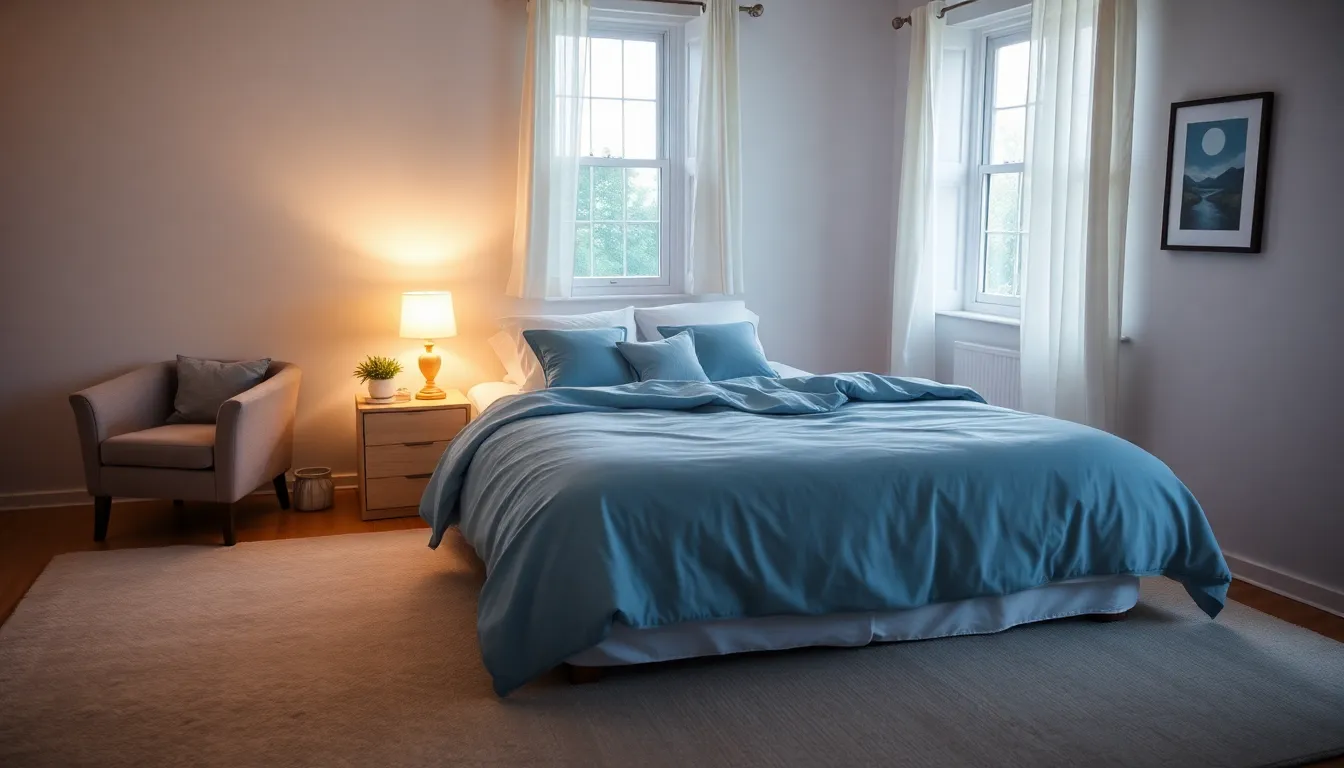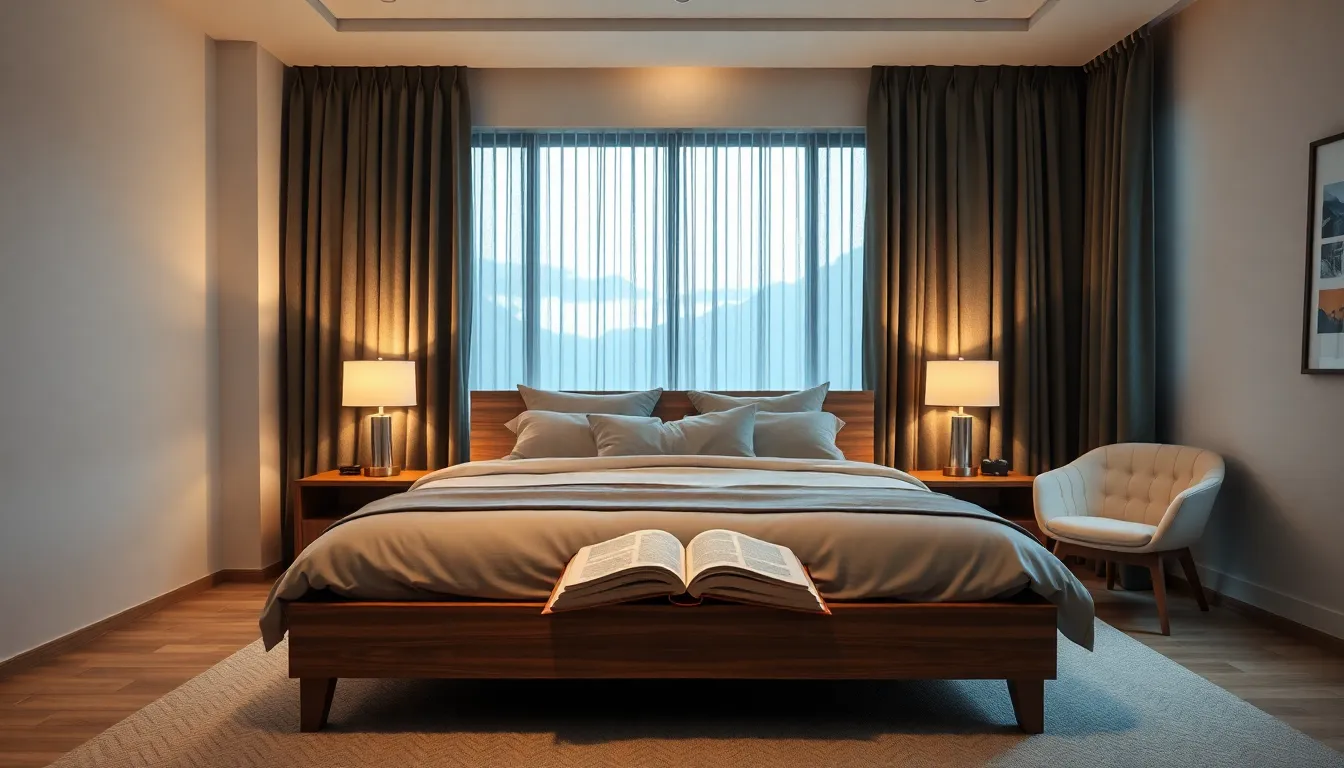Table of Contents
ToggleIn a world buzzing with activity, one might wonder: is it really possible to achieve the elusive state of peacefully sleeping? The answer is a resounding yes. Picture this: a cozy bed pulled snugly with soft blankets, a gentle night breeze, and every worry floating away like clouds on a sunny day. It sounds dreamy, doesn’t it? But, achieving those dreamy nights takes more than just a comfy pillow. Let’s jump into the intriguing realm of sleep, uncover its importance, explore common sleep disorders, and equip you with actionable tips for a serene slumber. Your journey to peaceful nights starts now.
Understanding the Importance of Sleep

The Benefits of Quality Sleep
Sleep is not just a break from our daily grind: it’s a crucial foundation for a healthy life. When one experiences quality sleep, several remarkable benefits take place. First off, quality sleep enhances cognitive functions like memory and decision-making. Imagine trying to solve problems or recall information after a restless night. It’s like trying to use a phone with a dead battery. Enough rest, on the other hand, energizes the brain, making it sharp and ready for challenges.
Also, quality sleep fuels creativity. Have you ever woken up with a bright idea or a solution to a lingering problem? That’s the magic of sleep working wonders. Not only does it boost creativity, but it also improves mood. A well-rested person tends to show more emotional stability and positivity, making them easier to be around. They wake up with the internal metaphorical sunshine that’s often missing post-sleepless nights.
How Sleep Affects Mental Health
Sleep is intricately linked with mental health. Studies show that individuals who have chronic sleep issues are at a higher risk for mental health disorders like anxiety and depression. It’s a vicious cycle: poor sleep exacerbates these conditions which, in turn, lead to further sleep disturbances. Imagine climbing a mountain made of sand: the harder one climbs, the more they sink.
Making sleep a priority can help break that cycle. By understanding these connections, one can take proactive steps towards better mental health by prioritizing sleep. It’s essential to shift perceptions of sleep from that of a luxury to a necessary cornerstone of overall well-being.
Physical Health Benefits of Sleep
The benefits of quality sleep extend beyond the mind and into the body. Consistent, restful nights contribute to cardiovascular health, bolster the immune system, and even regulate weight. Sleep acts like a repair service for the body: during this time, essential processes like muscle repair and tissue growth happen. Basically, while we dream, our body is hard at work keeping us healthy. Who knew that lying down could be so productive?
Interestingly, sleep deprivation has been linked to a host of physical health issues, including obesity. That’s right. A lack of sleep can disrupt hormones that regulate appetite, leading to increased cravings and weight gain. Hence, peaceful sleeping doesn’t just feel good: it is vital for long-term health.
Common Sleep Disorders and Their Impact
Recognizing Signs of Poor Sleep Quality
Understanding sleep and identifying various disorders can lead to better sleep quality. Common sleep disorders include insomnia, sleep apnea, and restless leg syndrome. One of the first signs of poor sleep quality often shows up as daytime fatigue. If she finds herself dozing off during meetings or having trouble concentrating, that might signal an underlying issue. Another alarming sign is the frequent inability to relax at night. Tossing and turning should not be the norm.
Sleep apnea, for instance, is often characterized by an irregular breathing pattern during sleep. Although it might be innocent in appearance, this can have significant health consequences if left untreated. Awareness of these signs can empower individuals to seek help and improve their sleep, paving the way for those well-deserved peaceful nights.
Tips for Improving Sleep Hygiene
Creating a Peaceful Sleep Environment
Creating a sleep environment that promotes relaxation can be a game-changer. Start by decluttering the space: a clean room can help clear the mind. Dim the lights and keep the temperature cool, around 60 to 67 degrees Fahrenheit: that’s often the sweet spot for sleeping. Choosing comfortable bedding is crucial too: think quality mattress and supportive pillows. Keeping electronics out of the bedroom can also significantly reduce distractions and improve chances of peacefully sleeping.
Also, incorporating soothing colors like blues and greens can create a calming atmosphere. A peaceful environment is a recipe for relaxation.
Establishing a Relaxing Bedtime Routine
Consistency is key when it comes to sleep hygiene. Establishing a relaxing bedtime routine can signal to the body that it’s time to wind down. This might include activities like reading, taking a warm bath, or practicing gentle stretching. Engaging in these activities can foster an environment that encourages the transition into peaceful sleep. Think of it as a pre-game ritual for those relaxing nights.
Experts recommend going to bed at the same time every night. After a while, your body will adapt, helping her naturally feel sleepy at the right time.
Utilizing Relaxation Techniques Before Sleep
Mindfulness and Meditation for Better Sleep
Incorporating mindfulness can be incredibly beneficial for sleep. Practicing meditation not only quiets the mind but also brings awareness to one’s thoughts, allowing for a release of stress before bed. Guided meditations tailored for sleep can be found everywhere, making it easier than ever for anyone to tap into this powerful practice. It’s like a warm-up session for the brain before hitting the dream state.
For beginners, simply focusing on the breath and allowing thoughts to drift away can enhance the quality of sleep. It’s all about finding what works best for that individual journey to relaxation.
Breathing Exercises to Promote Relaxation
Another relaxation technique to explore is breathing exercises. Techniques like the 4-7-8 method can be highly effective. By inhaling for four seconds, holding for seven, and exhaling for eight, she might find that pent-up stress begins to evaporate, paving the way for deeper, more peaceful sleep. This simple yet effective technique is easily accessible and can be practiced anywhere, anytime.







